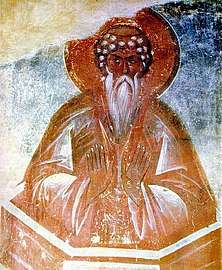Daniel the Stylite
Saint Daniel the Stylite (c. 409 – 493) is a Saint and stylite of the Eastern Orthodox, Roman Catholic and Eastern Catholic Churches. He is commemorated on 11 December according to the liturgical calendars of these churches.[1][2]
Saint Daniel the Stylite | |
|---|---|
 | |
| Venerated in | Eastern Orthodoxy
Eastern Catholic Church Roman Catholic Church |
| Feast | December 11 |
History
Early life
St. Daniel was born in Maratha, a village in upper Mesopotamia near Samosata in present-day Turkey. He entered a monastery at the age of 12 and lived there until he was thirty-eight. During a voyage he made with his abbot to Antioch, he passed by the city of Telanissos (today Deir Semaan) and received the benediction and encouragement of St. Simeon the Stylite. Then he visited various holy places, stayed in various convents, and retired in 451 A.D. into the ruins of a pagan temple.
Stylite
St. Daniel established his pillar north of Constantinople. The owner of the land where he placed his pillars had not been consulted, hence he appealed to the Byzantine emperor and patriarch Gennadius of Constantinople. Gennadius proposed to dislodge him, but was deterred through unknown means. Gennadius ordained Daniel as a priest. When the ceremony was over, the patriarch administered the Eucharist by means of a ladder, which Daniel had ordered to be brought. Gennadius then received the Eucharist from Daniel. People from all over came to see him and touch his pillar, which healed the faithful. Daniel stood through rain, snow, and the freezing cold.
Daniel lived on the pillar for 33 years. Due to continuous standing, his feet were reportedly covered with sores, cuts, and ulcers, and the winds of Thrace sometimes stripped him of his scanty clothing.[3]
He was visited by both Emperor Leo I the Thracian—accompanied by King Gubazes I of Lazica[4]—and Emperor Zeno. As a theologian, he came out against monophysitism.
Associated prayers
The following is his prayer before he began his life on the pillar:
I yield Thee glory, Jesus Christ my God, for all the blessings which Thou hast heaped upon me, and for the grace which Thou hast given me that I should embrace this manner of life. But Thou knowest that in ascending this pillar, I lean on Thee alone, and that to Thee alone I look for the happy issue of mine undertaking. Accept, then, my object: strengthen me that I finish this painful course: give me grace to end it in holiness. [5]
The following is the advice he gave to his disciples just before his death:
Hold fast humility, practice obedience, exercise hospitality, keep the fasts, observe the vigils, love poverty, and above all maintain charity, which is the first and great commandment; keep closely bound to all that regards piety, avoid the tares of the heretics. Separate never from the Church your Mother; if you do these things your righteousness shall be perfect.[6]
See also
- Simeon Stylites
- Pole-sitting
- Hermit
- Ascetic
- God: Sole Satisfier
Notes
- Online, Catholic. "St. Daniel the Stylite - Saints & Angels - Catholic Online". Catholic Online. Retrieved 2016-08-19.
- "Daniel the Stylite - OrthodoxWiki". orthodoxwiki.org. Retrieved 2016-08-19.
- Vita S. Daniel, ap. Surium, ad diem ii. decemb. cap. xli., xlii., xliii.
- Dawes & Baynes (1948), p. 79.
- Cellier, x. 344, 403, 485
- Robertson, Christian History ii. 41-3, 274
References
- Dawes, Elizabeth & Baynes, Norman H. (1948), Three Byzantine Saints: Contemporary Biographies of St. Daniel the Stylite, St. Theodore of Sykeon and St. John the Almsgiver. London: B. Blackwell. Online version from Internet Medieval Sourcebook.
External links
- St Daniel the Stylite Orthodox Icon and Synaxarion (December 11)
- Orthodox Church in America - Lives of the Saints